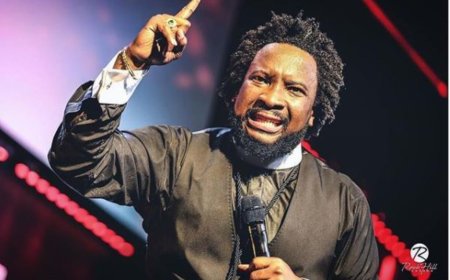How 2024 Presidential Candidates Used Social Media to Shape Election Issues – A Study by Ghanaian Scholar
A recent study by Prof. George Bob-Milliar examines how presidential candidates in Ghana utilized social media to engage voters, shape election issues, and address challenges such as misinformation during the 2024 elections.

1.
By [Your Name], Top Knowledge TV
In recent years, social media has become an undeniable force in shaping political landscapes across the world. The 2024 presidential elections in Ghana were no exception, as candidates harnessed the power of digital platforms to engage voters, influence issues, and mobilize support. A groundbreaking study by Ghanaian scholar, Professor George Bob-Milliar, sheds light on the various strategies employed by candidates in using social media during the election cycle. His research reveals both the potential and the pitfalls of this new era in political campaigning.
The Rise of Digital Campaigning in Ghana
According to Prof. Bob-Milliar’s study, the 2024 elections witnessed a remarkable shift in how presidential candidates approached campaigning, with social media emerging as the central tool for communication. In previous election cycles, political parties relied heavily on traditional media like radio, television, and print. However, the growing influence of platforms such as Facebook, Twitter, TikTok, and WhatsApp changed the dynamics, enabling candidates to directly reach voters, especially the younger demographic.
1. Influencer Marketing and Paid Campaigns
A key component of the digital strategy was the widespread use of influencer marketing and paid campaigns. Candidates tapped into the power of social media influencers to push their messages to a broader audience. These influencers, often with large followings, became the faces of political ads and endorsements. However, Prof. Bob-Milliar’s study highlights that this strategy raised ethical concerns, particularly regarding transparency and the integrity of the messages being spread. The study suggests that the use of influencers for political gain must be regulated to ensure fair and truthful communication.
2. Engaging the Youth through Social Media Platforms
One of the most significant outcomes of the study was the recognition of social media’s role in engaging the youth. Young voters, who are typically harder to reach through traditional media, became a target audience for political campaigns via platforms like TikTok and Instagram. Short-form videos, memes, and viral content dominated the election discourse, allowing candidates to discuss key issues such as education, employment, and the economy in an easily digestible format.
WhatsApp also became a crucial tool for mobilizing voters. Campaign groups used the app to organize grassroots movements, share materials, and even host virtual meetings. The accessibility of WhatsApp made it the perfect medium for real-time, community-driven engagement.
3. The Challenge of Disinformation
While social media allowed for better voter engagement, it also brought challenges in the form of disinformation. Prof. Bob-Milliar’s study underscores the troubling rise in false information, especially during critical moments of the campaign. Misinformation spread quickly across platforms, with both major political parties using these tools to discredit each other, sometimes by sharing manipulated videos or fake news articles. This posed a significant threat to the integrity of the elections and highlighted the need for robust fact-checking mechanisms and media literacy initiatives.
4. The Call for Regulation
In light of the growing influence of social media, Prof. Bob-Milliar advocates for a regulatory framework that would govern the use of digital platforms during elections. The Electoral Commission of Ghana has already expressed concerns about the unchecked use of social media and the dangers it poses to democratic processes. There are calls for regulations that would ensure transparency in political advertisements, particularly in terms of paid content and influencer endorsements.
5. Promoting Media Literacy
Recognizing the risks posed by disinformation, several civil society organizations, such as Penplusbytes, have stepped up their efforts to educate the public on media literacy. These initiatives are vital in helping voters discern fact from fiction and ensuring that their participation in the election is informed. Programs aimed at young people, in particular, were highlighted as essential in combating the spread of fake news and empowering the electorate.
Conclusion: A New Era of Political Campaigning
The 2024 presidential elections in Ghana have marked a new era in political campaigning, with social media playing a pivotal role in shaping election issues and voter engagement. As Prof. Bob-Milliar’s study shows, while digital platforms have the potential to foster greater political participation and discussion, they also bring challenges related to misinformation and ethical concerns.
Moving forward, it will be crucial for Ghana’s electoral framework to evolve in response to these changes. A balanced approach, one that embraces the benefits of digital campaigning while protecting the integrity of the democratic process, will ensure that social media remains a force for positive political change.
What's Your Reaction?




















































































